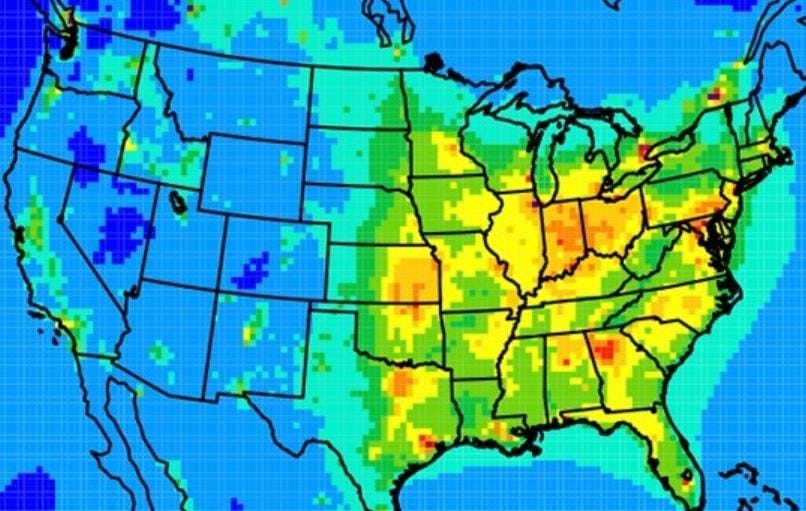Zeus: Cleaner water, not bigger cars, needed to boost economy post-crisis
Playing politics to a scared nation won't help us rebuild.

This 2010 data map shows a significant decline in air pollution in the U.S. as a result of strict air-quality policies since 1990. NASA/Atmospheric Chemistry and Physics.
SAN FRANCISCO (Callaway Climate Insights) — For shock value, the Trump Administration’s rollback of auto emission standards this week at a time when the world is fighting a deadly respiratory virus was a master class in political showmanship.
But that’s where it ends. An infrastructure plan working its way through Congress as part of a second stimulus bill would be a much better way of supporting businesses post-crisis and preparing the country for the coming impact of climate change.
Following its refusal to include lower airline emissions in the $2.2 trillion U.S. economic bailout last week, the administration is now sending a message to the Trump base that the virus will not change the president’s anti-regulatory playbook. Just as he plans to pull out of the Paris Agreement for good if he wins re-election, Trump is uncowed by facts and science.
These acts, which critics say could add a billion tons of emissions to U.S. skies, send a message in an election year, but in the case of the lower emission standards are unlikely to ever materialize. Legal action by California and other states will tie it up for years and likely end up in the Supreme Court. Five auto companies, including Ford Motor (F), have already agreed to a better deal with California.
Most of all, despite the declines in oil prices this spring, Americans have moved on from the big gas guzzlers popular a decade ago. Promising to make them cheaper to encourage a rollover of the existing fleet for new cars, which is at the heart of the Trump plan, won’t convince people to trade in their cars and trucks for bigger ones that take more gas.
Not anytime soon, at least. March sales are starting to come in down some 40% because of the lockdown. And they will be worse in April.
The Trump plan requires automakers cut emissions by 1.5% per year for the next six years, down from 5% a year under Obama administration regulations. So it won’t help this year, and then it will be in the courts.
The most important reason the rollback has been dubbed tone-deaf, however, is the rise of electric cars. Electric vehicle sales last year in this country were about 245,000 — only a fraction of the 17 million cars and light trucks sold nationwide, according to Statista. Most of those were Teslas (TSLA), but a small number were Chevys, Audis, and Nissans. In China, which is ahead of the U.S., about 1.2 million were sold.
My last car wasn’t electric, but my next one likely will be. Technology moves faster than government regulations in every instance.
I understand it’s important right now to support our businesses with as little red tape as possible. If Trump really wants to help, he’ll find a way to work with Congress on a real plan for infrastructure investment after the virus fades. One way to do that is to offer to support green infrastructure strategies to help cities transform ahead of the worst impacts of climate change.
Mike Bloomberg’s failed presidential campaign strategy included a detailed platform on infrastructure investment nationwide that Trump could cherry-pick from as part of his call for $2 trillion in new infrastructure investment.
Another plan by House leaders in Congress to address drinking water pollution by investing billions in clean water and wastewater infrastructure would also accomplish business goals, get people working again, and help protect us from the next possible virus.
None of these will help the administration find another $2 trillion, but they would help support his base, and rebuild the country. And at least keep him out of the courts.


Ironically, emissions are way down not because of MPG fuel standards but because of the recession...!
On point